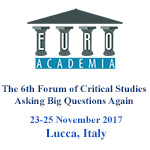Euroacademia Conferences
 Europe Inside-Out: Europe and Europeanness Exposed to Plural Observers (9th Edition) April 24 - 25, 2020
Europe Inside-Out: Europe and Europeanness Exposed to Plural Observers (9th Edition) April 24 - 25, 2020 Identities and Identifications: Politicized Uses of Collective Identities (9th Edition) June 12 - 13, 2020
Identities and Identifications: Politicized Uses of Collective Identities (9th Edition) June 12 - 13, 2020 8th Forum of Critical Studies: Asking Big Questions Again January 24 - 25, 2020
8th Forum of Critical Studies: Asking Big Questions Again January 24 - 25, 2020 Re-Inventing Eastern Europe (7th Edition) December 13 - 14, 2019
Re-Inventing Eastern Europe (7th Edition) December 13 - 14, 2019 The European Union and the Politicization of Europe (8th Edition) October 25 - 26, 2019
The European Union and the Politicization of Europe (8th Edition) October 25 - 26, 2019 Identities and Identifications: Politicized Uses of Collective Identities (8th Edition) June 28 - 29, 2019
Identities and Identifications: Politicized Uses of Collective Identities (8th Edition) June 28 - 29, 2019 The European Union and the Politicization of Europe (7th Edition) January 25 - 26, 2019
The European Union and the Politicization of Europe (7th Edition) January 25 - 26, 2019 7th Forum of Critical Studies: Asking Big Questions Again November 23 - 24, 2018
7th Forum of Critical Studies: Asking Big Questions Again November 23 - 24, 2018 Europe Inside-Out: Europe and Europeanness Exposed to Plural Observers (8th Edition) September 28 - 30, 2018
Europe Inside-Out: Europe and Europeanness Exposed to Plural Observers (8th Edition) September 28 - 30, 2018 Identities and Identifications: Politicized Uses of Collective Identities (7th Edition) June 14 - 15, 2018
Identities and Identifications: Politicized Uses of Collective Identities (7th Edition) June 14 - 15, 2018
From the SGP to the TSCG through the Lenses of European Integration Theories
-
-

-
Presentation speakers
- Ariane Aumaitre Balado, College of Europe, Brugge, Belgium
- Download presentation
Abstract:
Started in 2010, and still not fully over in some countries, the Euro crisis has been the major shock European economy has been through ever since the beginning of European integration. Triggered by the 2008 Global Financial Crisis, it made apparent a series of structural imbalances and failures in the design of the Eurozone, putting into question the own nature of the Economic and Monetary Union (EMU) and the survival of the common currency. In spite of the doubts emerged concerning the future of the Euro, the response to the crisis eventually led to a deepening of economic integration within the EU. This is visible in the establishment of the European Stability Mechanism (ESM), the creation of a Banking Union and the deepening of fiscal coordination through measures such as the Six pack, the Two pack and the so-called Fiscal Compact. Economic coordination was also strengthened though the Euro Plus Pact. Which were the driving forces and key actors of this deepening in economic integration? Are they found at a national or at a supranational level? These are the questions that this paper aims to answer, through the study of the strengthening of the fiscal and economic pillars of EMU. The analysis will be done through the lenses of the two grand theories of European integration: Neofunctionalism and Liberal Intergovernmentalism; as well as a more recent theory: the New Intergovernmentalism approach. The paper will argue that the deepening of fiscal coordination can be theorized as the result of asymmetrical interdependence and differences in bargaining power among member states, which decide to transfer national sovereignty as a tool for reaching credible commitments.
-
Related Presentations

The Influence of the Immigrants in Atlantic, Colombia for the History Art, the Culture and Urban Identities in the XVIII-XX Centuries
- Giovanni Polifroni Lobo
- Delma Esther Rocha Alvarez













